The Aden Auxiliary Military Pioneer Corps and Aden Labour Corps were two interconnected non-combatant military units under British command during the Second World War. Both Corps comprised multiple companies, each established and disbanded at varying points throughout the conflict.
The overwhelming majority of men who served in the Aden Labour Corps and Aden Auxiliary Military Pioneer Corps were non-British, ‘native’ men of Arab ethnicity. Only a handful of British men served in these units, all of whom were senior officers. Although primarily based in and around Aden, men were liable for posting anywhere and were, on a number of occasions, operational overseas.
Aden Labour Corps
Although the Aden Labour Corps came under British Army command for the majority of the war (specifically, from October 1940), it was initially administered by the Air Ministry. Formed on 17 May 1940, the Corps was led by retired Indian Army officer, Major A H MacGuffie. By September 1940, four companies had been established, each 120-men strong.
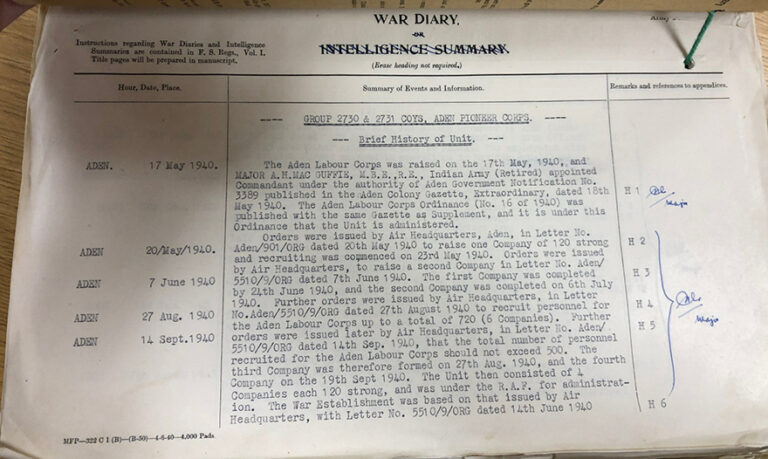
The overarching intention of the Corps was to provide ‘unskilled labour for military and civil purposes in the event of Aden becoming a theatre of war’ (WO 169/17621). In particular, ‘to retain a supply of labour for such work as the repair of aerodromes, the repair of roads, loading and unloading ships and lorries, coaling, oiling etc’ (WO 169/17621).
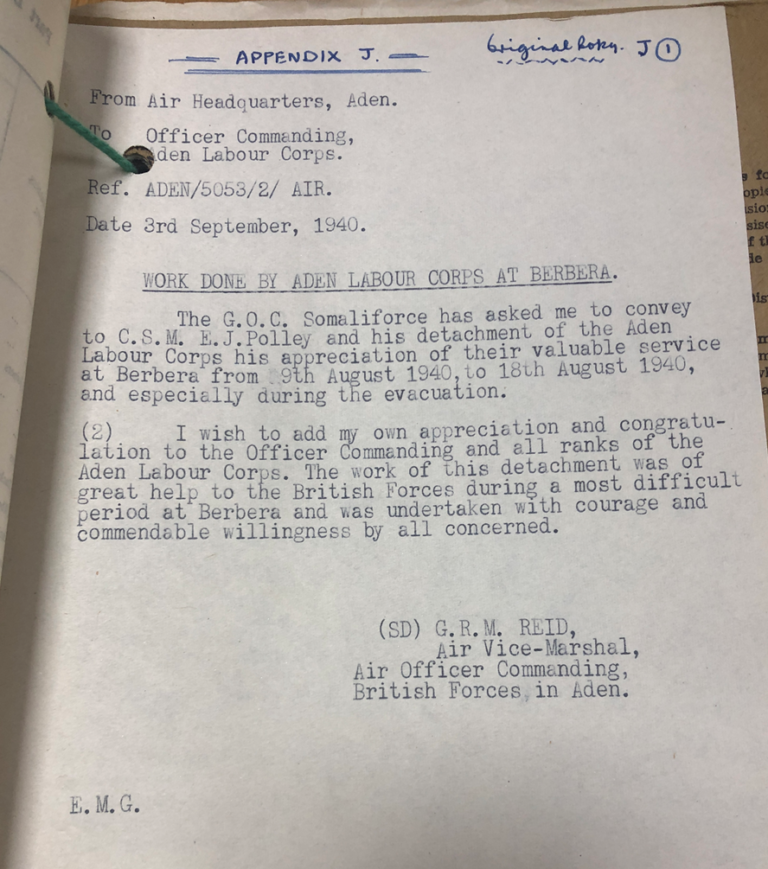
In August 1940, the first detachment of 126 Arab men was posted overseas. Specifically, to Berbera, for employment with the British forces engaged in operations in British Somaliland against Italian forces.
When transferred to British Army command, the Corps was restructured to comprise just two companies: 1420 Company and 1421 Company, with a total combined strength of 690.
In March 1944, 1420 and 1421 Companies were re-designated as 2730 and 2731 Pioneer Corps Companies respectively.
Aden Auxiliary Military Pioneer Corps
The Aden Auxiliary Military Pioneer Corps was officially formed with the establishment of 1401 Company in November 1940. Generally, all of the Corps companies were of no fixed size, but usually comprised between 100 and 500 men. Much like its parent unit, the Aden Labour Corps, the role of the Pioneer Corps was to provide ‘unskilled labour’ for military purposes.
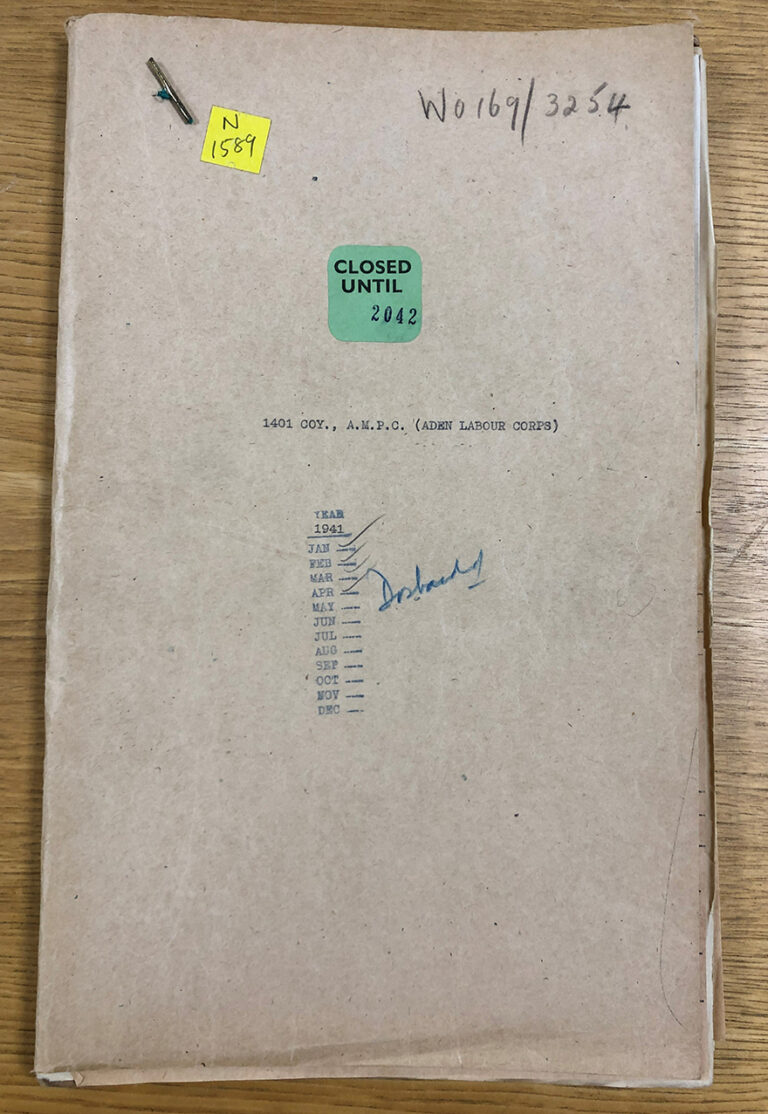
The second Company to be formed as part of this Corps was 1402 Company in February 1941. One month later, both Companies were posted to Berbera. Interestingly, it is noted in the war diary for 1402 Company that when the attestation of men for service overseas commenced on 12 March 1941, only 180 were attested and 137 were discharged (WO 169/3255).

As alluded to in the above excerpt, it is likely these discharges related to men feeling generally dissatisfied with the initial terms of service for the Pioneer Corps. Particularly, as these terms were deemed comparatively unfavourable with those of the Aden Labour Corps.
What was their role?
The types of duties carried out by the Pioneers in Berbera involved road maintenance, airfield construction, port operation, loading/unloading cargo and working in the hospital under South African supervision. At various points, men were attached to the British Army’s Ordinance Depot, the Royal Engineers and Supply Depot.
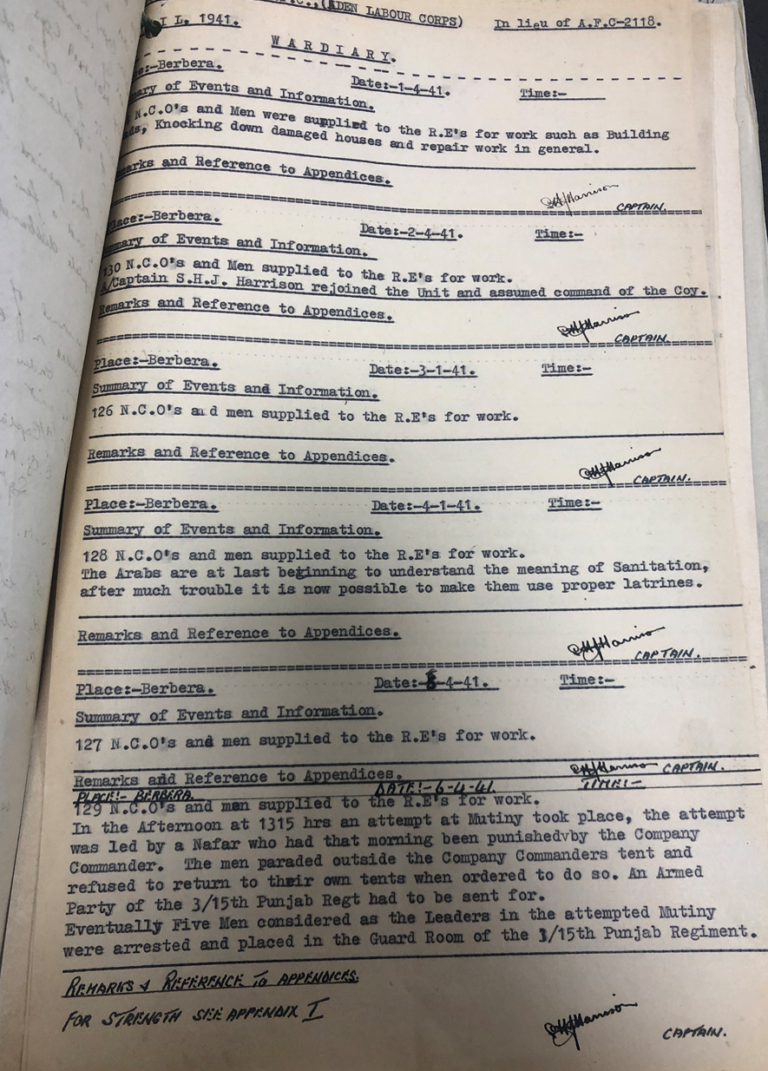
Included in 1402 Company’s war diary are a number of interesting anecdotal stories and insights about the Corps’ time overseas. For example, on 18 March 1941 the author wrote about an incident where one man ‘struck a bomb with his shovel and had a hand blown off’ (WO 169/3255).
In another example, on 6 April 1941 it was reported that an attempt at ‘Mutiny’ took place when a group of men, parading outside the Company Commanders tent, disobeyed orders to return to their own quarters. An armed party of the Indian Army’s Punjab Regiment was subsequently sent for and the five Arab men considered as ringleaders were arrested and placed in the Regiment’s Guard Room. One week later, the men were discharged from the service and sentenced to 40 days imprisonment at the Civil Prison Aden (WO 169/3255).
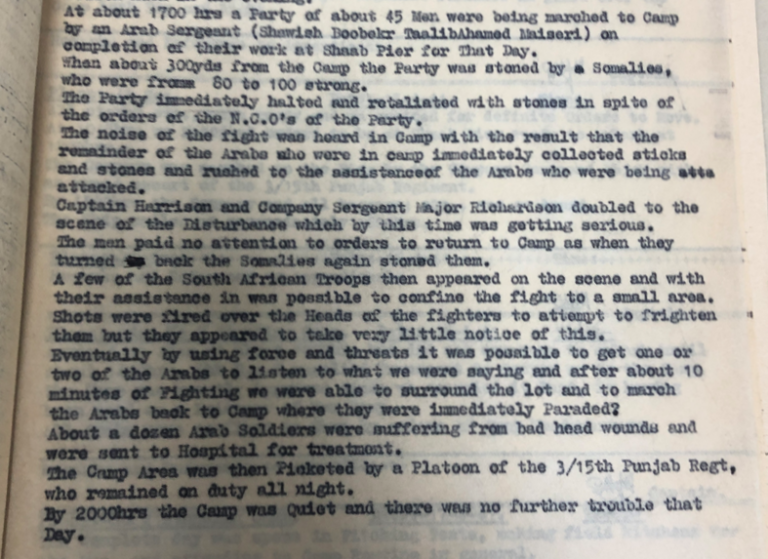
On 13 April 1941, a more serious incident occurred:
‘At about 1700 hrs a party of about 45 men were being marched to camp by an Arab sergeant on completion of their work at Shaab Pier for that day.
When about 300 yards from the camp the party was stoned by Somalies who were from 80 to 100 strong.
The party immediately halted and retaliated with stones in spite of the orders of the N.C.O’s of the party.
The noise of the fight was heard in camp with the result that the remainder of the Arabs who were in camp immediately collected sticks and stones and rushed to the assistance of the Arabs who were being attacked…
Shots were fired over the heads of the fighters to attempt to frighten them but they appeared to take very little notice of this….
About a dozen Arab Soldiers were suffering from bad head wounds and were sent to hospital for treatment’ (WO 169/3255).
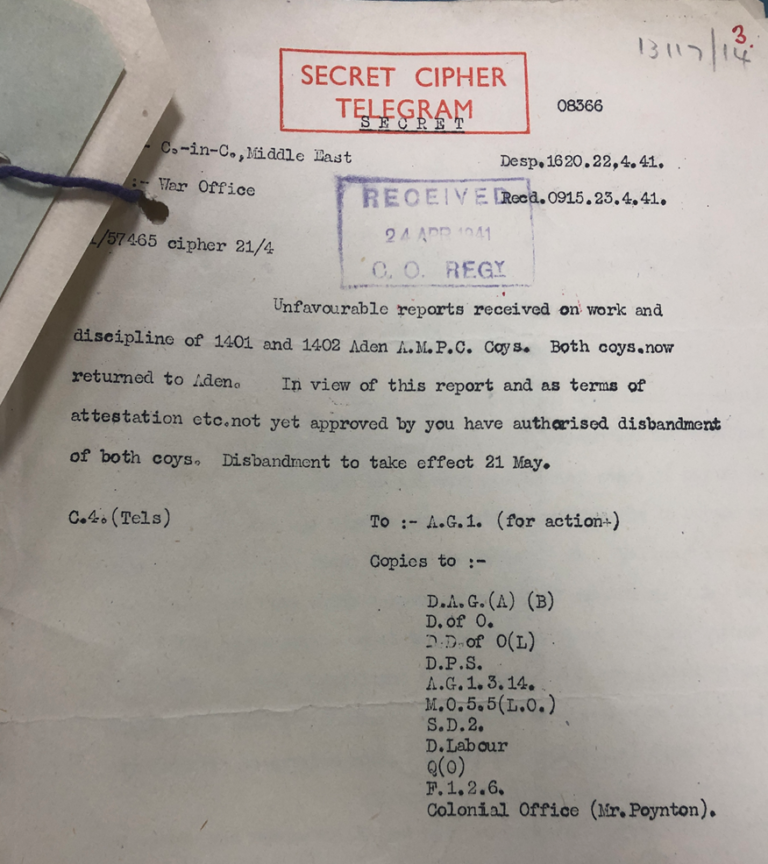
Following this incident and the subsequent return of both units to Aden, as well as the ‘unfavourable reports received on work and discipline of 1401 and 1402 Aden A.M.P.C. Coys.’, the War Office authorised the official disbandment of both Pioneer Companies. On 21 May 1941, 437 Arab men were officially discharged from the British Army (CO 968/38/12).
Other Pioneer Companies
Another significant development in the history of the Aden Auxiliary Military Pioneer Corps was on 27 March 1943, when Captain D N Seton, of The Welch Regiment, was instructed to form a new Company drawn from the tribes of Hadhramaut. This revival of the Corps saw the formation of ‘1422 Sultan Saleh’s Hadhramaut Pioneer Company’. Following a posting to Mukalla in the Eastern Aden Protectorate earlier in the year, the Pioneers embarked for the island of Socotra in December 1943, where it carried out standard tasks such as road construction and unloading cargo. The Company was disbanded in the spring of 1944.
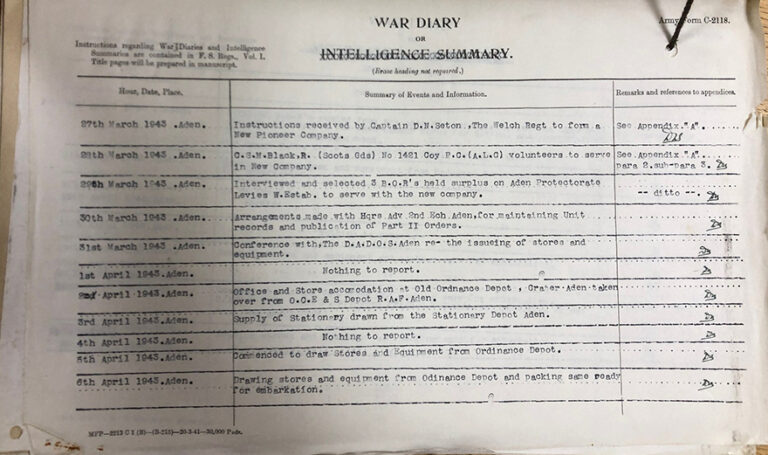
Additional units such as 2732 Pioneer Company, formed in spring 1944, were also a part of the Corps. Given that all of the Pioneer Companies were only operational for a short period of time before being disbanded, it is quite possible that men transferred between the Pioneer and Labour Corps, as well as between individual units.
Berbera is not in Lebanon; it was the capital and chief port of British Somaliland . The Aden Labour Corps were sent across the Gulf of Aden to assist in its defence, and then evacuation, after the Italians sent troops to capture Somaliland on August 4th. This is made clear in the memo of 3rd September from Air Vice-Marshal Reid.
Berbera now is a seaport of self declared Somaliland Republic from Somali Republic on May 1991.